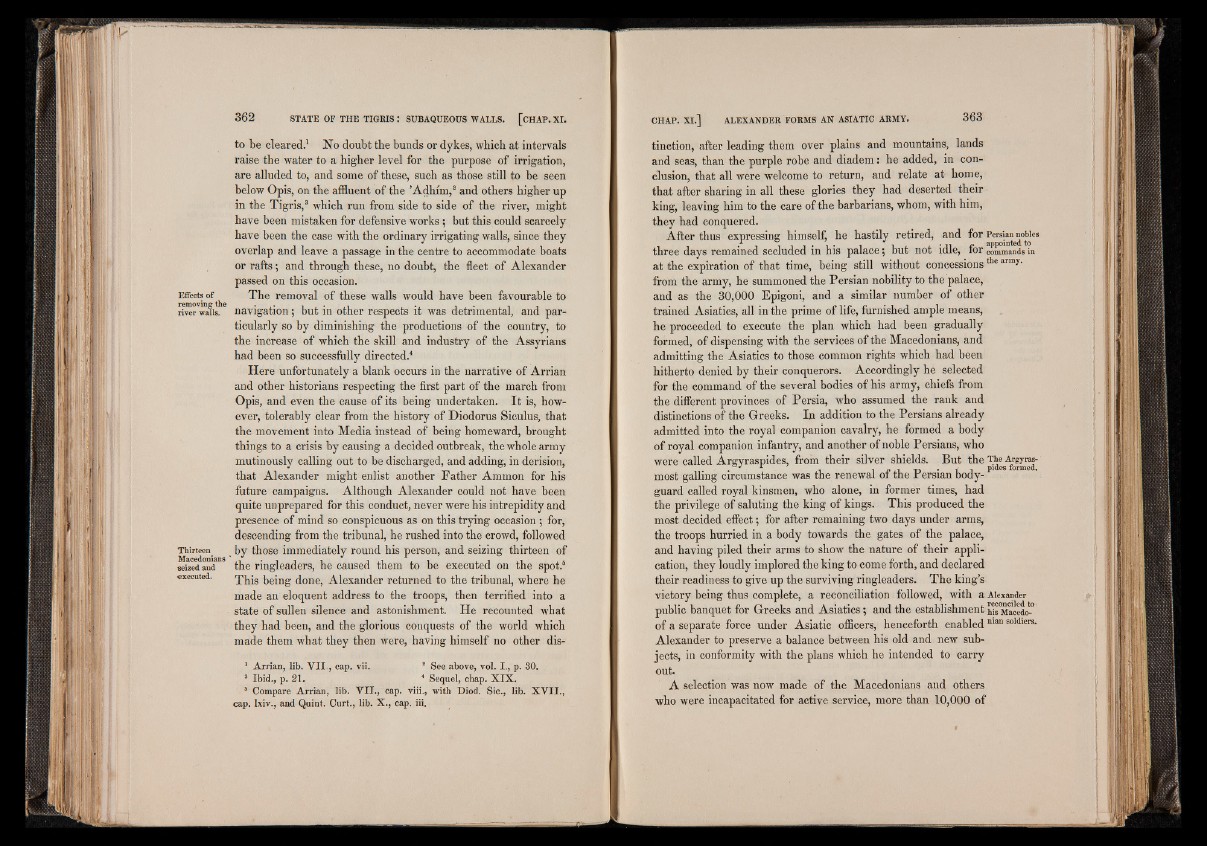
Effects of
removing the
river walls.
Thirteen
Macedonians
seized and
executed.
to be cleared.1 No doubt tbe bunds or dykes, wbich at intervals
raise tbe water to a higher level for the purpose of irrigation,
are alluded to, and some of these, such as those still to be seen
below Opis, on the affluent of the ’Adhim,2 and others higher up
in the Tigris,3 which run from side to side of the river, might
have been mistaken for defensive works; but this could scarcely
have been the case with the ordinary irrigating walls, since they
overlap and leave a passage in the centre to accommodate boats
or rafts; and through these, no doubt, the fleet of Alexander
passed on this occasion.
The removal of these walls would have been favourable to
navigation; but in other respects it was detrimental, and particularly
so by diminishing the productions of the country, to
the increase of which the skill and industry of the Assyrians
had been so successfully directed.4
Here unfortunately a blank occurs in the narrative of Arrian
and other historians respecting the first part of the march from
Opis, and even the cause of its being undertaken. It is, however,
tolerably clear from the history of Diodorus Siculus, that
the movement into Media instead of being homeward, brought
things to a crisis by causing a decided outbreak, the whole army
mutinously calling out to be discharged, and adding, in derision,
that Alexander might enlist another Father Ammon for his
ftiture campaigns. Although Alexander could not have been
quite unprepared for this conduct, never were his intrepidity and
presence of mind so conspicuous as on this trying occasion ; for,
descending from the tribunal, he rushed into the crowd, followed
by those immediately round his person, and seizing thirteen of
the ringleaders, he caused them to be executed on the spot.5
This being done, Alexander returned to the tribunal, where he
made an eloquent address to the troops, then terrified into a
state of sullen silence and astonishment. He recounted what
they had been, and the glorious conquests of the world which
made them what they then were, having himself no other dis-
1 Arrian, lib. V I I ., cap. vii. 3 See above, vol. I., p. 30.
3 Ibid., p. 21. 1 Sequel, chap. X IX .
5 Compare Arrian, lib. V I I ., cap. viii., with Diod. Sic., lib. X V I I .,
cap. lxiv., and Quint. Curt., lib. X., cap. iii.
tinction, after leading them over plains and mountains, lands
and seas, than the purple robe and diadem: he added, in conclusion,
that all were welcome to return, and relate at home,
that after sharing in all these glories they had deserted their
king, leaving him to the care of the barbarians, whom, with him,
they had conquered.
After thus expressing himself, he hastily retired, and for Persia^nobies
three days remained secluded in his palace; but not idle, for commands in
at the expiration of that time, being still without concessions ihe army-
from the army, he summoned the Persian nobility to the palace,
and as the 30,000 Epigoni, and a similar number of other
trained Asiatics, all in the prime of life, furnished ample means,
he proceeded to execute the plan which had been gradually
formed, of dispensing with the services of the Macedonians, and
admitting the Asiatics to those common rights which had been
hitherto denied by their conquerors. Accordingly he selected
for the command of the several bodies of his army, chiefs from
the different provinces of Persia, who assumed the rank and
distinctions of the Greeks. In addition to the Persians already
admitted into the royal companion cavalry, he formed a body
of royal companion infantry, and another of noble Persians, who
were called Argyraspides, from their silver shields. BuIt the (ptiidne- sA frogrmyreadsmost
galling circumstance was the renewal of the Persian bodyguard
called royal kinsmen, who alone, in former times, had
the privilege of saluting the king of kings. This produced the
most decided effect; for after remaining two days under arms,
the troops hurried in a body towards the gates of the palace,
and having piled their arms to show the nature of their application,
they loudly implored the king to come forth, and declared
their readiness to give up the surviving ringleaders. The king’s
victory being thus complete, a reconciliation followed, with a Alexander
public banquet for Greeks and Asiatics; and the establishment HsMacedo*”
of a separate force under Asiatic officers, henceforth enabled man soIdiers-
Alexander to preserve a balance between his old and new subjects,
in conformity with the plans which he intended to carry
outA
selection was now made of the Macedonians and others
who were incapacitated for active service, more than 10,000 of